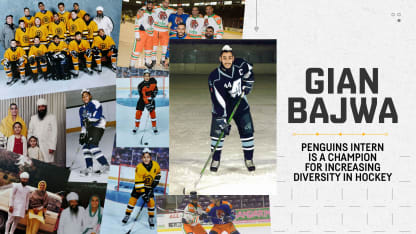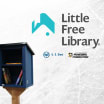Gian Bajwa, a Penguins corporate partnerships intern and a sports MBA graduate student at San Diego State, comes to the business side of hockey after growing up playing in Toronto.
As an athlete who looked different than his teammates, Bajwa experienced some hurdles rooted in discrimination, stereotyping and bigotry. Now, he's using his own experiences to encourage others to keep an open mind, increase diversity in the hockey community and show other students that job opportunities in the sport exist for everyone.
Penguins Intern Is a Champion for Increasing Diversity in Hockey

By
Caleigh Burchfield / Pittsburgh Penguins
"I'm always interested in leveraging my past experiences into my current experiences," Bajwa said. "I firmly believe that there should be more minority representation in the business side of sports as well, just from seeing what I saw growing up. I think having people who understand that struggle and the sort of things that you might be going through, especially on the business or coaching or developmental side, is important.
"So I'm a champion for that and doing whatever I can to help bring the message of increasing diversity and inclusion in sports, whether it's playing or on the business side."
Bajwa is keeping his options open in the short term, but his long-term goals are to be involved in scouting and player development in professional hockey while also contributing his time to community efforts wherever possible to help grow the game at the youth level.
"For many of us who dream of playing pro sports someday, there are really rewarding careers available working in sports," Penguins chief revenue officer Terry Kalna said. "In many cases, those careers also allow us to give back to the sport that we love. Gian worked really hard to put himself in a position to be noticed. He's taken advantage of that opportunity. He and our Penguins 2021 intern team have stayed very engaged and proactive throughout an all-virtual internship. Our team has been excited to have him on board, and he's setting himself up for a great career."
Bajwa's playing career started after his father, Gurparkash - who immigrated to Ontario, Canada from Punjab, India with his mother, Manjit, in the 1980s - would often listen to hockey games on the radio while he worked as a taxi driver. The commentary and excitement got him hooked, and in turn, Gurparkash shared that with his son.
"I kind of picked it up from my dad," Bajwa said of his love for the game. "I remember he would always be sitting in front of the TV, and it was noticeable that he was such a big fan, because he would have typical fan reactions where he'd just jump out of his seat and celebrate and stuff like that. As a kid, I didn't know too much about the sport, but it was exciting to see my dad get so excited about it."
And like many kids, spending night after night watching games made Bajwa want to actually play himself. After learning to skate on ice frozen in his backyard, lots of begging and some help from friends, he was finally able to convince his parents to register him in a league when he was 8.
Throughout the years, Bajwa's speed, skill and scoring ability as a defenseman set him apart from many of his teammates and other players his age. After a few years of playing at the House level with the Etobicoke Bulldogs in Rexdale, Ontario, he made the Toronto Aeros hockey team. But Bajwa said that his talent wasn't the only thing that differentiated him from other players.
"I had one particular experience that really made me aware of the sort of prejudice and discrimination that was taking place," he said. "I got dressed and went to my first game after being selected to the team. I get to the arena and one of the coaches pulls me aside and says, 'Hey, sorry - something happened, and now you can't play the game today.' And I'm there in all my equipment, wondering, 'Why not? Why can't I play? You selected me to play on this team, and I'm a member of this team.'"
He received a roundabout answer, but his understanding was that they decided to add someone onto the team whose abilities weren't quite up to his level so that Bajwa would be pushed out.
"So that's where I kind of got discouraged, and I think that was my first encounter with that sort of discrimination," Bajwa said. "I was selected on the team based on my merits, but someone else was essentially taking my spot even though I was told to show up and play. Then I had to sit in the stands with all my equipment on, and it was very embarrassing. But I didn't let that discourage me."
As time progressed, Bajwa continued to get better and better, ultimately serving as a captain for three years and assistant captain for four with the Aeros. However, he continued to notice how different he looked compared to his teammates, as players on opposing teams wouldn't let him forget it.
"I would get questions all the time, I would have taunts from other players. They would say some really horrid, horrid things," Bajwa said. "I learned to brush it off, but at the same time, it kind of developed some self-doubt. Eventually it got to the point where I would think, 'Do I even belong here? Is this something that I really want to do? And is it worth facing all of these things and having to jump through the hurdles that I had to jump through, especially when trying out for higher divisions?'"
Fortunately, Bajwa had a great support system in his parents, coaches and teammates - as well as a trust and belief in his own skill set - that helped him keep playing the sport that he loved.
Furthermore, Bajwa said that the adversity he faced also helped him develop some important skills, such as perseverance, humility and understanding. Those qualities translate incredibly well into his work now with the Penguins.
So far, Bajwa has had the opportunity to help with a variety of projects with the Penguins, such as partnership sales, partnership activation, industry research and partnership analysis. Ultimately, he wants to help break stereotypes and increase diversity, equity and inclusion across the sports world and inspire others the same way that Harnarayan Singh inspired him.
Bajwa met the Sportsnet broadcaster, who made the famous "Bonino! Bonino! Bonino!" call during the 2016 Stanley Cup run, during the early days of Hockey Night in Canada Punjabi.
Watch: Youtube Video
The two of them had an opportunity to discuss their different experiences playing hockey, and Bajwa began following Singh's journey to becoming a marquee hockey play-by-play man.
"It inspired me to see him really owning that opportunity and leveraging his story, ultimately showcasing that, yes, I do look different, I am different, I come from a different background, but there's no reason someone that looks like me can't succeed in this industry," said Bajwa, who recently got the opportunity to tell his own story on Hockey Night in Canada Punjabi. "That sort of led me to being more confident in my abilities and pursuing my goals. And I hope that similarly, by seeing more representation in sports and getting more representation in the business of sports, it inspires others as well."
(English) "If you already feel like don't belong, someone else telling you or implying that you don't belong makes you second guess yourself."
— Hockey Night Punjabi (@HkyNightPunjabi) April 4, 2021
As a Sports MBA student and intern with the @Penguins, Gian Bajwa is working towards bringing more diversity to roles off the ice. pic.twitter.com/K9hkmwbAPy
For kids who want to get involved with hockey in whatever capacity it may be, whether it's on the ice or off the ice, Bajwa says the biggest thing is to never think about their physical appearance being a barrier.
"If you think about it, you're putting more limitations on yourself," he said. "I think the biggest thing to understand is to persevere no matter what. I think that is the message that I would definitely provide to anyone, is that if you have certain goals, whether or not you think you can achieve them, you should at least try."
He feels fortunate to have the opportunity to pursue his own goals right now with the Penguins, an organization that is committed and dedicated to making diversity, equity and inclusion part of their culture and core business practices and doing everything they can to make real and lasting changes. Bajwa pointed to the
Willie O'Ree Academy
as a perfect example of that.
"Sometimes the counter argument to diversity and inclusion is, 'well, nothing is stopping players from minority backgrounds from excelling in the sport,'" Bajwa said. "And while there may not be visible barriers, the stereotypical barriers exist. I think that's the root of where things need to be fixed, is having those stereotypes broken down.
"And I know that those talks have been taking place. I've seen them. It's great to see an organization as prominent as the Penguins really pioneer in that, and great to hopefully be a part of that."


















































